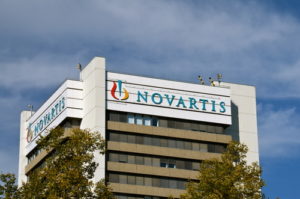DOJ Enforcement Spotlight -- Novartis Settles Whistleblower Kickback Case for $390M
 By the C|C Whistleblower Lawyer Team
By the C|C Whistleblower Lawyer Team
The Department of Justice continues its recent streak of False Claims Act wins with its $390 million settlement Friday with Novartis Pharmaceuticals Corp. resolving charges the pharmaceutical giant gave kickbacks to specialty pharmacies in return for recommending two of its drugs, Exjade and Myfortic. Of the $370 million, roughly $287 million will go to the federal government and $83 million to the settling states. The settlement follows the January 2014 and April 2015 settlements of specialty pharmacies Bioscrip, Inc. and Accredo Health Group under which the pharmacies agreed to pay a total of $75 million to resolve False Claims Act charges based on the same allegations. That brings to $465 million the total government recovery from this alleged kickback scheme. See DOJ Press Release.
According to the government, Novartis violated the False Claims Act and the Anti-Kickback Statute by giving kickbacks to specialty pharmacies in return for recommending Exjade, an iron chelation drug, and Myfortic, an anti-rejection drug for kidney transplant recipients. For Exjade, the Government claimed Novartis gave kickbacks in the form of patient referrals and rebates to Bioscrip and Accredo to induce them to recommend Exjade refills. Novartis allegedly pressured the pharmacies to emphasize Exjade’s benefits to patients while understating the drug’s serious, potentially life-threatening, side effects. For Myfortic, the Government claimed Novartis gave rebate contracts to specialty pharmacies to induce them to recommend to doctors that they switch patients to Myfortic from competitor drugs.
With respect to Exjade, the government alleged Novartis created a “closed distribution network” of just three specialty pharmacies — BioScrip, Accredo, and US Bioservices. This gave Novartis control over how many Exjade patients would be assigned to the pharmacies.
To increase Exjade refills, Novartis allegedly leveraged this control over patient referrals to pressure the three specialty pharmacies to hire or assign nurses to call Exjade patients and, under the guise of education or clinical counseling, encourage them to order more refills. They did so, according to the government, while understating the serious, potentially life-threatening risks of taking Exjade like kidney and liver failure. The government argued Novartis encouraged the pharmacies to promote Exjade in ways the FDA had characterized as “unsubstantiated.”
In announcing the settlement, Manhattan U.S. Attorney Preet Bharara highlighted the patient harm arising from the alleged kickback scheme:
Novartis gave kickbacks to influence specialty pharmacies to provide patients one-sided advice about Exjade, without disclosing the drug’s serious side effects, and to recommend switching patients who were using other drugs to Myfortic. Novartis turned pharmacies that should have been disinterested healthcare providers into a biased salesforce for the drug-maker.”
Health and Human Services Chief Counsel Gregory E. Demske similarly stressed that “reliable information is essential for patients taking drugs on a long-term basis, and money should not distort the advice that patients receive about drugs with serious side effects.”
The allegations leading to the settlement were first brought to the attention of federal law enforcement by David Kester, who filed a whistleblower lawsuit under the qui tam provisions of the False Claims Act. He will receive a yet-to-be disclosed whistleblower award from the government’s recovery.
Tagged in: Anti-Kickback and Stark, Whistleblower Case,